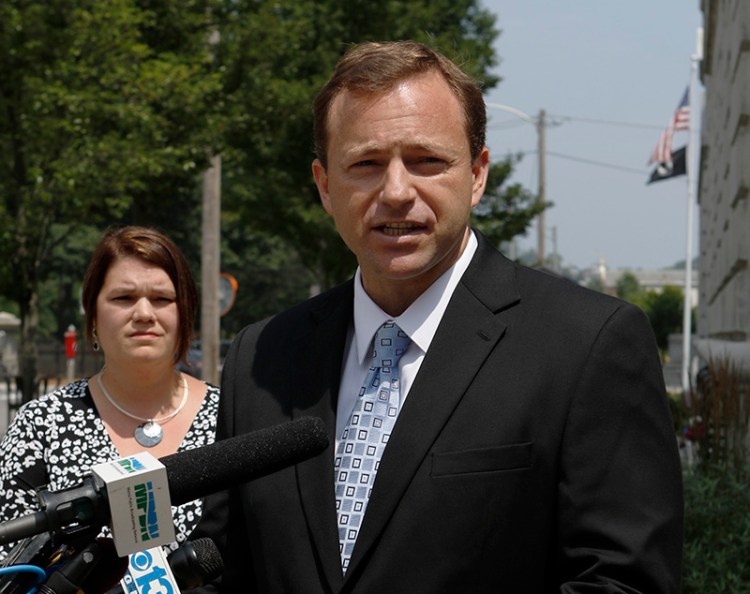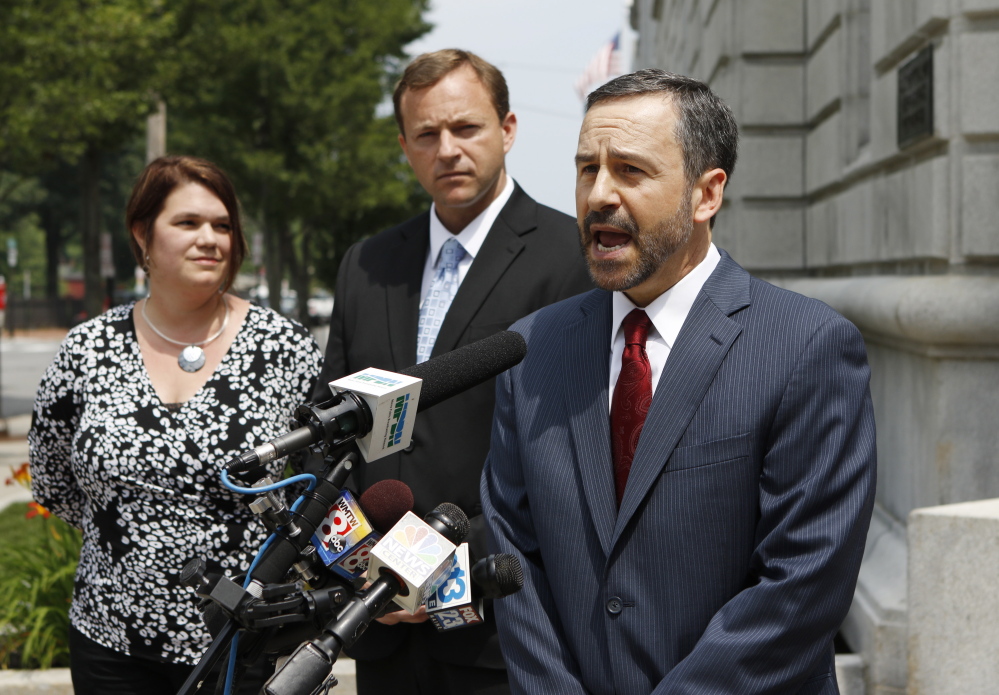House Speaker Mark Eves filed a civil lawsuit against Gov. Paul LePage on Thursday, alleging that LePage used taxpayer money and the power of his office to prevent Eves from being hired by a private school in Fairfield.
That action violated several of Eves’ constitutional and other rights, according to the 27-page complaint. Those include his First Amendment rights of free speech, free association and political affiliation, as well as his 14th Amendment right to due process. The suit cited Eves’ “liberty and property interests in being free from unreasonable government interference” and his “liberty interest in his reputation in connection with the termination of his employment caused by LePage.”
Eves, appearing at the courthouse alongside his wife, Laura, and attorney David Webbert, said the lawsuit wasn’t just about him, but about halting the governor’s pattern of retributional behavior.
“This is not about the money,” Eves said. “This is about righting a wrong. It’s about holding the governor accountable for blackmailing Good Will-Hinckley, a school that’s provided a safe haven for at-risk kids for over 125 years. That’s what this is about. It’s also about making sure that this does not happen to any other family, any other private organization, any other citizen. Accountability has to happen or (the behavior) will continue.”
The lawsuit, filed Thursday afternoon in U.S. District Court in Portland, has been anticipated since the board of directors at Good Will-Hinckley voted to rescind its offer to pay Eves $150,000 a year in salary and benefits to become the organization’s next president. The Democrat said the board told him before his contract was terminated that LePage, a Republican, threatened to eliminate $530,000 in annual state funding for the school unless it removed him from the job.
Eves’ lawsuit marks the first time since 1975 that a sitting Maine governor has been sued as an individual. A summary of the filing indicated that Eves was suing the governor in his “official, individual and personal capacities.”
“Acting out of personal rage, vindictiveness and partisan malice, Gov. Paul LePage blackmailed a private school that serves at-risk children into firing its president, the Speaker of Maine’s House of Representatives,” the complaint began.
The complaint goes on to accuse LePage of “knowingly” breaking federal law by threatening the school’s board chairman in a “secretive, handwritten note.” The note, the complaint alleges, threatened to eliminate the state’s funding to the school, thereby jeopardizing over $2 million in private donations that the school needed to remain open. The complaint says the governor’s threat left the board of Good Will-Hinckley with no choice but to rescind its job offer to Eves.
The complaint argues that the threat follows a “well-known pattern” of the governor using his powers “to bully and intimidate anyone who dares to disagree with him.”
GOVERNOR DEFENDS HIS ACTIONS
LePage’s spokeswoman, Adrienne Bennett, responded to Eves’ suit ahead of its filing, issuing a statement Thursday morning.
“This is a political lawsuit,” Bennett said. “It has no legal merit and is the Democrats’ concerted attempt to accomplish what they couldn’t at the ballot box inside a courtroom.”
During an interview on WGAN radio Thursday morning, LePage said he believed Eves was “a plant, from the unions, to destroy charter schools. … I believe that’s what his motive is.”
LePage described Eves as an enemy of charter schools and compared his threat to pull funding to an occasion when he stopped a man from assaulting his wife in a domestic dispute. “Should I have stepped in?” LePage asked. “Legally, No. But I did. And I’m not embarrassed about doing it.”
Good Will-Hinckley operates one of the state’s first charter schools, the Maine Academy of Natural Sciences. Eves has been a critic of charter schools, and his opposition is what prompted LePage to oppose his hiring as the school’s president.
The governor has repeatedly defended his actions, and he used a July 8 weekly radio address to describe Eves’ hiring as a “political hack-o-rama at it’s worst.” Cynthia Montgomery, the governor’s legal counsel, issued a statement this month welcoming the lawsuit, saying, “Bring it on.”
Webbert said that in addition to seeking compensatory damages, Eves’ complaint also seeks to have a federal court tell the governor that his actions violated federal law.
“The governor needs to be told by somebody he will listen to – and I think a federal court is probably the only place we can get that – that he has to stop retaliating, not just against Mark and lots of other people, but against anybody who dares to disagree with him,” Webbert said.
He said Eves is seeking damages from LePage, not the state.
“We are suing one person and one person only,” he said. “He happens to be the governor, but in this state and this country, nobody is above the law.”
INVESTIGATION ALREADY UNDERWAY
Webbert said that although elected officials are afforded more protections from civil lawsuits than citizens, he hopes the court will make LePage testify under oath.
The controversy over the governor’s action rocked the State House in June and is expected to continue through the ordinarily calm summer and autumn months when state lawmakers have returned to their districts. Lawmakers on the Legislature’s Government Oversight Committee have already initiated an investigation to determine how LePage’s threat to withhold the funding affected the school, and whether it was an abuse of his powers.
The results of the probe, conducted by the Legislature’s watchdog agency, the Office of Program Evaluation and Government Accountability, are expected in September. Although OPEGA will make no determination of right or wrong, its findings could serve as the foundation for impeachment proceedings, which some lawmakers already have requested.
The governor has acknowledged that he made the threat. LePage has argued that the funding in question is discretionary, and has maintained that Eves was unfit for the position. The governor and his supporters have since attempted to raise questions about Good Will-Hinckley’s decision to hire Eves, arguing that he doesn’t have the educational background of previous presidents and labeling the board’s hiring choice as cronyism.
HANDWRITTEN NOTE A KEY RECORD
Eves was selected by the Good Will-Hinckley board of directors in June after a nine-month national search. Board members cited his clinical and administrative experience in the field of behavioral health and his policy and leadership experience.
The school, which has agreed to pay Eves $30,000 for terminating his contract, is currently running ads seeking a new president. Its board of directors has been largely silent throughout the controversy. In a June 26 statement, the board said that “political biases” had no impact on its decision to hire Eves and that its decision to end the employment agreement was an act of self-defense.
Eves announced Thursday that he has a new job as a development officer for Woodfords Family Services, a private organization that provides community services to needy children and teens.
Eves and Webbert, his attorney, have said that there’s written documentation of the governor’s threat.
In addition to a June 8 letter raising concerns about Eves’ opposition to charter schools, the governor sent another letter to Jack Moore, the chairman of the school’s board of directors. In that letter, Eves and Webbert said, LePage threatened to pull state funding unless the school reconsidered its decision to hire Eves.
Webbert said the second letter, a handwritten note, was confirmed by Montgomery, the governor’s chief legal counsel. Webbert said he had talked with Montgomery in hopes of resolving the dispute over Eves’ hiring without resorting to legal action.
Moore has acknowledged that he received a handwritten letter from LePage, but he has not answered questions about whether the letter contained a threat to pull the school’s funding unless it terminated Eves’ contract. Moore, in a written statement released June 25, said he “would be glad to release the letter if it is found, but it may have been discarded.”
The Portland Press Herald has requested the document through a Freedom of Access Act request. The letter is subject to the state’s public records law, but it’s unclear whether the governor has retained a copy.
The last sitting governor to be named as a defendant in a lawsuit was James Longley. In 1975, Roger Rush of Portland sued him and, later, state lawmakers, for blocking a bill that prevented Rush from setting up his own bank and printing money. Rush’s appeal was denied by the Maine Supreme Judicial Court, which wrote, “There does not appear to be a complaint coupled with a prayer for relief as would be justiciable in this court.”
____________________
CORRECTION: This story was updated at 2:55 p.m. on July 31 to correct Mark Eves’ title at Woodfords Family Services.
Copy the Story LinkSend questions/comments to the editors.





Success. Please wait for the page to reload. If the page does not reload within 5 seconds, please refresh the page.
Enter your email and password to access comments.
Hi, to comment on stories you must . This profile is in addition to your subscription and website login.
Already have a commenting profile? .
Invalid username/password.
Please check your email to confirm and complete your registration.
Only subscribers are eligible to post comments. Please subscribe or login first for digital access. Here’s why.
Use the form below to reset your password. When you've submitted your account email, we will send an email with a reset code.